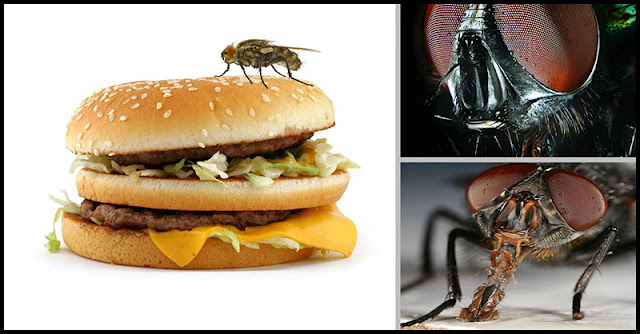You should be worried about pesky flies landing on your food. According to Thomas J. Daniels, Ph.D., associate research scientist and director of Fordham University’s Vector Ecology Lab at Louis Calder Center, houseflies can carry at least 100 pathogens, like viruses, bacteria, and parasites.
These bugs can spread disease in a few ways once they have picked those germs up. Contaminated foods, manure, and other germ-heavy spots have viruses and bacteria that stick to the flies’ bodies and on the tiny hairs on their legs. They will then fly away and land somewhere else, like in your food, and leave some of those nasty germs behind.
Dr. Daniels added:
“So we’re potentially at risk even from a fly landing on food, though the amount of pathogen transmitted is likely to be small.”
However, the bigger problem comes from fly vomit and this is really gross.
Instead of biting tiny nibbles off your plate, flies landing on your dinner puke digestive juices onto the food in order to break it down for them to “lap up a liquid meal.” But that’s not all.
The worst part is that the vomit a fly leaves on your food is filled with germs from its last meal. As compared to the pathogens on the flies’ feet, those that are inside their bodies live longer – which means that there is a bigger chance the viruses and bacteria stayed alive. This would create a recipe for disease from the time those germs mix with the fly vomit and stay in the fly’s mouth until the next time it eats.
A board-certified infectious diseases specialist Brent W. Laartz, MD says that flies can spread salmonella, E. coli, rotavirus, and Hepatitis A. This can really be scary. Aside from this, there’s also Shigella, which is a group of bacteria that can cause stomach pain, fever, and diarrhea.
On the other hand, not all flies carry all those germs. The ones mentioned don’t exist on everything that the flies feed on – they are all fecal viruses and bacteria.
Dr. Laartz says that:
“The fly would have to land on raw meats or feces to spread these bacteria [and viruses] to your food.”
The chances that the fly would pick up anything up before munching on your meal would be lesser if you would keep your kitchen clean.
Additionally, your chances of getting sick will still depend on how strong your immunity system, how many germs the fly carries and how long it sat on your food. If your house is clean and a fly touched your food, maybe you can probably keep eating safely.
But if you are in an area buzzing with bugs, like a picnic, then that would be the time that you should be worrying. In places like this, the more the flies landed on someone’s meal, the more germs they could leave. This is why it is recommended to cover your food while you are waiting to eat.









